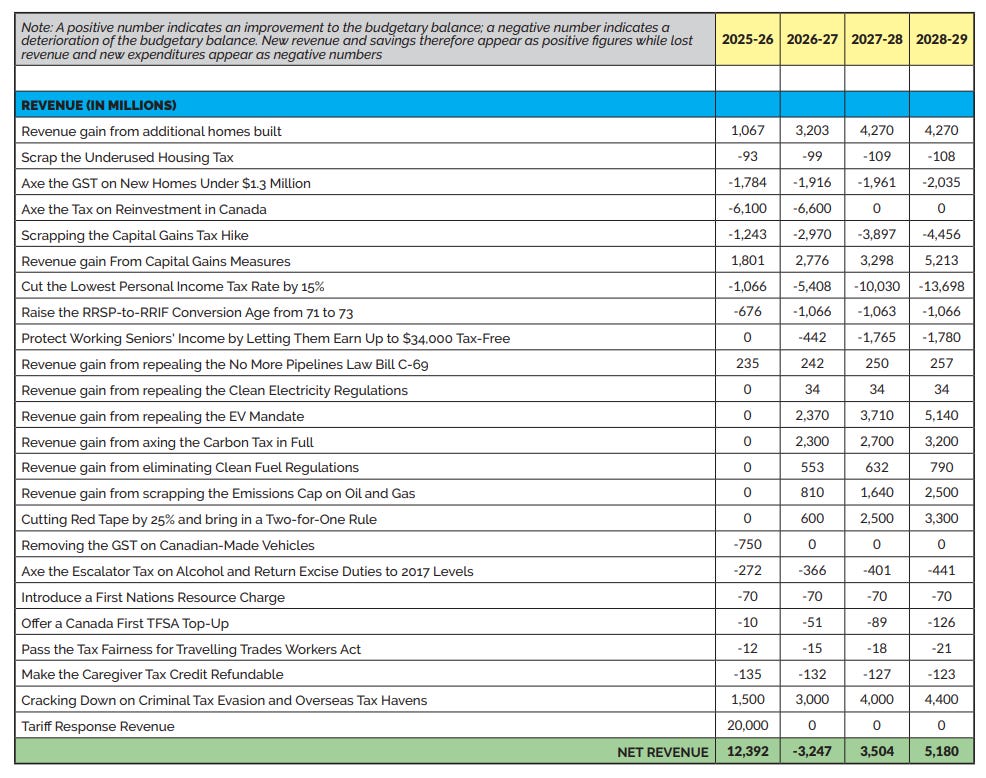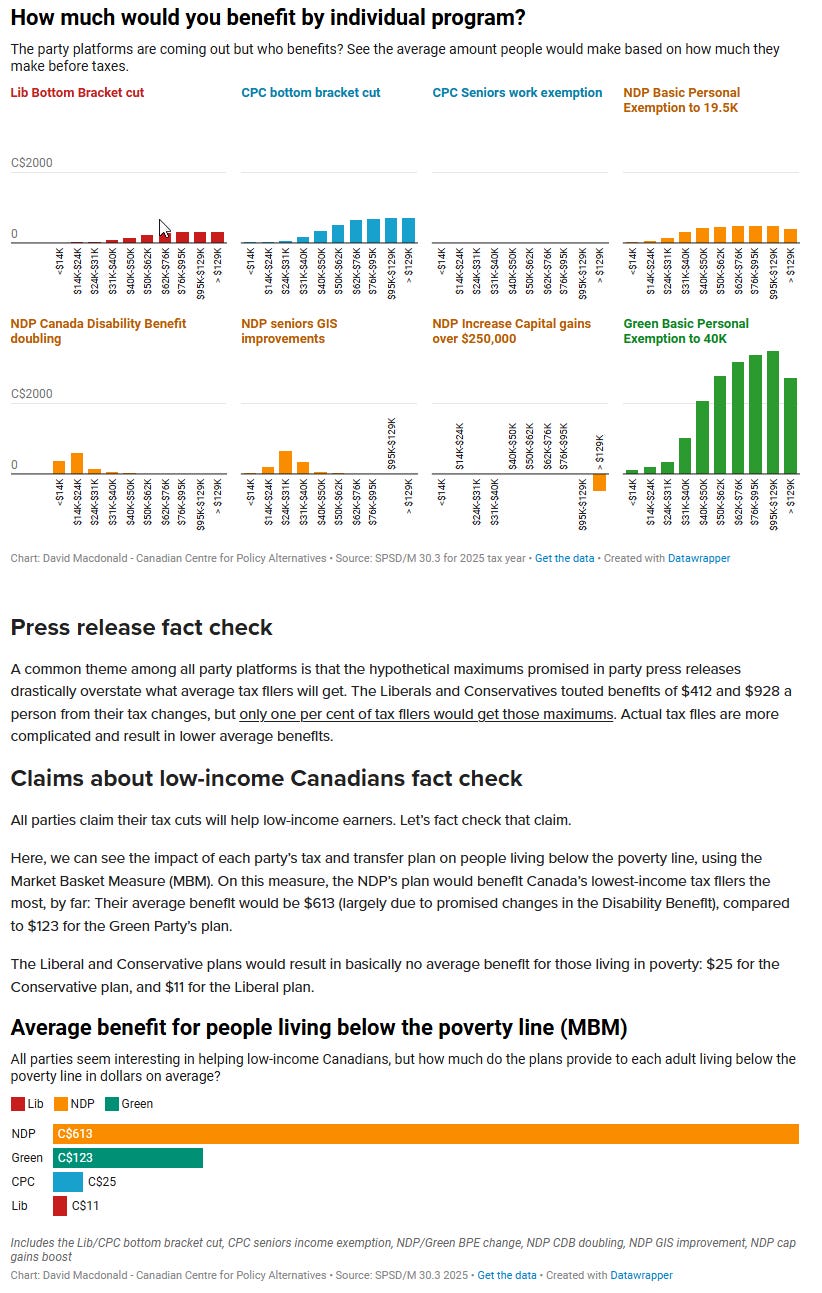Thoughts on the 2025 Conservative costed platform.
30 pages.
17 photos of Poilievre.
5 full-page spreads.
Waited until after early voting was closed to release it.
(link)
tl;dr reads like it was put together at the last minute, promises a CPC government is unlikely to be able to deliver, breaching the charter of rights in the name of law and order. Slogans! And more slogans! $100 billion in deficit spending over 4 years. Photos of PP.
Bring it home, tax reform
”Within 60 days of forming government, we will launch a Tax Reform Task Force made up of farmers, builders, entrepreneurs, economists, and workers—not Ottawa insiders. Their job will be to deliver a simple, fair tax code that:
- Rewards work and saving.
- Closes loopholes for the wealthy and well-connected.
- Eliminates unnecessary red tape.
- Makes it easier for Canadians to file and understand their taxes.”
Right out of the gate, there’s some contradictory messaging in a considerable part of the critique about Mark Carney is that he ran a private investment firm and will govern policy in a way where he benefits from it, but yet, entrepreneurs, or in other words, the wealthy and well-connected who benefit from loopholes will help close those loopholes. At least he’s willing to let economists in on tax policy in addition to the populist nonsense. But more concerning is that these are campaign talking points; it isn’t policy, and there’s no expansion on how these goals will be achieved.
Fiscal Common Sense
Tax relief is only one side of the coin; spending discipline is the other. We'll ensure every dollar spent gets results and stops the runaway growth of government that leaves everyday Canadians behind. We will:
• Pass a one-for-one spending law. For every new dollar spent, an equal amount must be reduced.
• Cut red tape by 25% and bring in a two-for-one rule. We will reduce regulations by 25% within two years, and ensure going forward that two regulations are eliminated for every new one. We will also ensure that for every $1 of new administrative burden, $2 is removed. The Auditor General will be required to verify that we deliver on these commitments.
Point 1 and 2 contradict each other. Is it 1 for 1 or 2 for 1? Moreover, while removing two regulations for each new one might sound nice on paper, if you don’t think about it too much, which regulations does he have in mind for the chopping block? Has he given it any thought? Which services will be cut, which regulations will be eliminated?
Tables of the projected savings and expenses are featured near the end of this article (and at the end of the policy document).
“Unleash Canadian energy and resources”
is in some parts good, but in others, well, repealing the C-48 tanker ban basically throws BC and its indigenous communities under the bus for Alberta’s benefit. The catch is that while it is entirely under the federal government’s jurisdiction to repeal the tanker ban, it cannot build LNG terminals in BC without British Columbia’s cooperation. Antagonizing BC and indigenous communities in this way isn’t even necessary as there’s ample room to expand the southern routes, which BC is already amenable to, where the federal government already owns the pipelines, and where LNG terminals (such as in Kitimat) are already being built.
Repealing C-69 is not surprising, but is also unnecessary; it basically sacrifices the indigenous communities upon Alberta’s altar for no reason — it can be amended to bypass the red tape when not transiting through indigenous territories (and incentivise building around, rather than through these communities).
The point about fast-tracking B.C.’s LNG Canada Phase 2 and the GNL Québec LNG project is interesting in what it reveals. PetroChina has a 15% stake in LNG Canada Phase 2, which is fine, to be clear, just contradictory to all the electoral rhetoric regarding China and the LPC.
It’s also, in some respects, an empty promise and a nonsense claim. C-48 does not extend to LNG carriers, and Phase 2 is already approved; there’s no fast-tracking necessary, and Poilievre’s promise to approve it immediately betrays either incompetence on his part or some extra-dimensional chess move that involves currying votes by insulting Canadians’ intelligence.
It’s even more egregious where GNL is concerned. There is nothing to fast-track. The Quebec government rejected the project back in 2021. While there is talk about Quebec being amenable to resurrecting this project, it needs to be negotiated. This is perhaps why at the French leaders’ debate, Poilievre avoided answering the question of whether he’d try to impose pipeline projects on Quebec and indigenous communities if he failed to secure their consent. Trying to force the issue is federal overreach and almost certainly the trigger for another constitutional and unity crisis.
Even with by some accounts 70% public support in Quebec for pipeline projects, reviving the project requires clearing the concerns regarding environmental impacts and compatibility with Quebec’s energy transition territory. I can promise the CPC’s base in Alberta that imposing federal jurisdiction over energy projects is not a precedent they want to be setting, even if they don’t care about the constitutional crisis aspect of it.
To be clear, resource extraction and infrastructure projects are good, but these promises to fast track projects that are either already approved or dead are empty and nonsensical. Likewise, the implication of imposing projects on provinces and indigenous communities for Alberta’s sole benefit is a nonstarter. Works for securing the Albertan vote, but involves potentially making enemies of Quebec and British Columbia.
“Fixing our ports by streamlining regulations and permitting, reforming borrowing caps, preauthorizing future development zones, exploring container shipping on the Great Lakes, extending the shipping season at the Port of Churchill, and reviewing the hours of work regulations for smaller ports
What is being left out here is that to extend Churchill’s shipping season requires building an icebreaker fleet we don’t have, as Churchill is not a warm water port, it also requires building considerable infrastructure through permafrost and wilderness. Both are costly endeavours, which do not appear to be costed in what is supposed to be a costed platform document.
On crime: A few things stand out here.
The “three strikes” proposal (three offenses then, a mandatory minimum 10-year sentence with conditions for release) is likely a constitutional debacle waiting to happen. The Supreme Court has already stuck down mandatory minimum sentences that are Grossly disproportionate to the crime (R v. Bissonnette (2022)) This also applies to life sentences. R v. Lloyd (2016), R v. Nur (2015), and R v. Boudreault (2018) also apply here. Quite a few supreme court decisions also have a thing or three to say about “no bail, parole, house arrest, or probation.”, as well, the restrictions on release come into opposition with several sections of the Charter of Rights and Freedoms.
”Jail not bail” also contravenes several sections of the charter, and as this is a recurring theme, same for the pledge to eliminate tent cities, which is particularly egregious when taken in contrast with the emphasis on affordable housing — if we’re to take the Conservative Leader at his word, Canadians deserve affordable housing, unless they’re homeless, in which case, they have no constitutional rights.
I’m all for cutting crime, but brazen abuse of the charter of rights and freedoms isn’t the way to to do it.
The military and border security
No major objections here, other than the pledge to “fix the CAF’s recruiting crisis by increasing the reserve force to 30,000 and the regular force to 71,000 within 18 months” this doesn’t even make sense, the recruiting problem means the CAf is having problems recruiting, just handwaving that they’ll fix it by increasing the numbers without telling us how, or how they’ll incentivise enlistment is just saying “we’ll fixc it by fixing it”. It doesn’t mean anything.
“Acquire two new heavy icebreakers for the Royal Canadian Navy, in addition to the two new icebreakers being delivered to the Coast Guard, for a total of four new icebreakers. • Build a new Arctic naval base in Churchill, Manitoba. This will serve as a base of operations for Canada’s new polar icebreakers and will allow the Port of Churchill to sustain a continuous commercial shipping season.”
This section should have been in the above section about Churchill. The document repeats itself a lot, it’s poorly structured, almost like it was thrown together at the last minute.
I like the idea of deploying military to secure the border, I’d proposed this in as a malicious compliance in response to President Trump’s demand for increased military spending and border security.
On Foreign Policy.
“Continue to strongly support Ukraine’s war to defend itself against Putin’s illegal invasion, including by sending Ukraine $22 billion in frozen Russian assets, and by always recognizing the sovereignty and integrity of Ukraine’s territory.”
This $22 billion figure appears to be based on an early pre-sanctions estimate of Russian reserves in Canadian holdings, which has not been identified or located.
According to the RCMP, considerably less has actually been frozen. The platform promises to give something we don’t have.
To be clear, I’m not opposed to or for funding Ukraine; a case can be made either way, and it makes sense to do so given the shared desire of all parties to step up within NATO while Washington steps back. I am however, in favour of not promising things that are beyond our capability to deliver on the count of a candidate apparently getting their information from social media.
Also.
”Recognize the legitimate winner of Venezuela’s election. A Conservative government will recognize Edmundo González as the winner of the 2024 election in Venezuela and as Venezuela’s rightful President.”
lol?
Quebec Policy
A lot of flowery words about respecting this and acknowledging that.
”Anti-Woke ideology: A Conservative government will put an end to the imposition of the Woke ideology in the federal public service and in the allocation of federal funds for university research.”
really curious about why this is in the Quebec policy section. Here’s a better idea, leave it for Quebec to decide what research is funded or isn’t, and keep the fed’s nose our of our affairs, in the spirit of “respecting Quebec’s autonomy”.
Finally we get to the costing tables at the very end, these cost and savings estimates ideally should have been included alongside the bullspoints throughout the document, but it isn’t surprising as the whole thing feels like it was slapped together haphazardly at the last minute (probably why it missed the early voting window).
This table is curious, as the major source of revenue is the tariff response that all parties are promising, because it’s already in effect. The long and the short of it is that there’s a projected $100 billion deficit over 4 years, we could nix the tax breaks and funnel the resulting surplus into paying down the debt and using the resulting savings on interests payments to fund, granted, much lesser tax cuts, but alas, why do that when you can add $100 billion to the debt instead? Fiscal responsibility and common sense, after all!
Policyalternatives.ca breaks down the three major parties’ tax breaks as follows:
Essentially, despite the “boots not suits” and rhetorically pandering to the “average Canadian” and working class, while the bulk of the benefit from these breaks goes to the richest 30%. In fact, the Canadians who need relief the most — those living under the poverty line stand to get all of $25 from these proposals, again, from policyalternatives:





